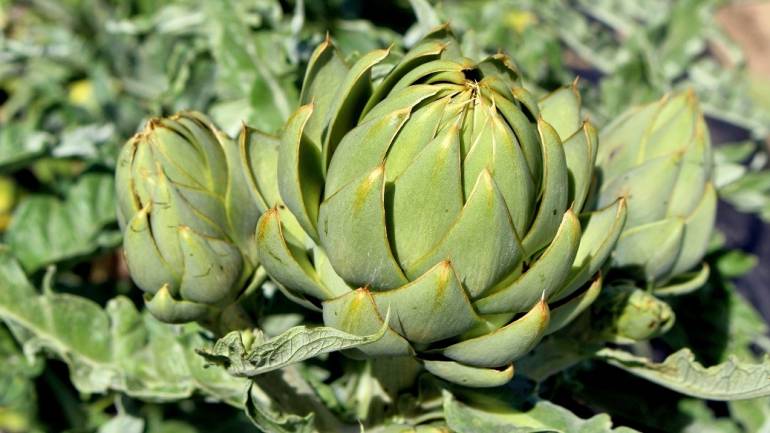In addition to being low in calories and aiding weight loss, artichoke has a beneficial effect on digestion, liver function and blood cholesterol levels thanks to its cynarin content. Why should you include artichoke in your diet and how to use the medicinal properties of extracts from this plant to improve your health and well-being? Here is the artichoke – its properties and effects.
Globe artichoke – what it looks like, its origin
The common artichoke(Cynara scolymus) is a plant with a distinctive appearance. The flowers of this plant are gathered in spherical inflorescences, surrounded by several layers of thick scale-like leaves. It is a plant native to the Mediterranean, but is cultivated throughout Europe and North America. Another variety of artichoke, the Spanish artichoke, is also used in culinary and herbal medicine, although to a much lesser extent. Significantly different in appearance from its green cousin, its spiky leaves and intense blue flowers make it easy to distinguish between the two varieties.
Artichoke – medicinal properties
The health-promoting properties of artichoke have been known and valued since ancient times. It was used for indigestion, liver and kidney problems. It wasn’t until the 20th century that more information about the artichoke’s health-promoting properties became available. In the extract of artichoke, Italian scientists discovered a compound that until now is the most valued component of this plant. It is cynarin (or 1,5-dicovanilochic acid), which has an effect on: liver and bile duct function, digestion and food metabolism, blood cholesterol and lipid levels. It is also helpful for weight loss and weight maintenance. It is worth mentioning one more ingredient of artichoke, important for health and well-being. This is inulin, which has a positive effect on regulating blood sugar levels and is also helpful in losing weight.
In addition to cynarin and inulin, artichoke leaves are a good source of: flavonoids, tannins, vitamins (e.g. vitamin C, niacin, provitamin A), minerals (including magnesium, potassium, calcium, phosphorus and iron). Dietarily, artichoke is a high-fiber, low-fat plant with a significant amount of mineral salts.
Artichoke – health-promoting effects
Cynarin has a very multidirectional effect. First and foremost, it supports the normal function of the digestive system and liver function. Cynarin has a diastolic and protective effect on hepatocytes (liver cells), stimulates the production and secretion of bile by the liver and facilitates its flow through the bile ducts. It increases the production of digestive juices, which has a beneficial effect on digestive processes.
Artichoke extract (e.g., as. artichoke in tablets) while supporting liver function, has an overall cleansing effect on the body. It has a slight diuretic effect, which facilitates the removal of harmful metabolic products from the body. Artichoke-based preparations also have a beneficial effect on cholesterol and lipid levels in the blood. Regular use of artichoke extract lowers the concentration of total cholesterol and triglycerides in the blood. Both the use of preparations in the extract of this plant, as well as consumption of it in its fresh form, promotes getting rid of excess weight and facilitates weight control.
Also check: herbs for digestive problems
Artichoke in tablets – for whom?
Preparations with artichoke extract have a supportive effect in liver diseases with disorders of bile production and flow (including, but not limited to: gallstones [link to article on gallstones], jaundice, inflammation of the gallbladder and bile ducts, digestive problems after gallbladder removal). Artichoke is also recommended for lowering cholesterol and lipid levels in the blood, as an aid in fat metabolism disorders. Artichoke preparations are also used prophylactically as an anti-atherosclerotic agent.
Artichoke and preparations based on it are also good means of supporting the proper work of the digestive system. It gently regulates the rhythm of bowel movements, prevents bloating and constipation, relieves digestive problems of various etiologies. It owes this to its high fiber content and its choleretic and cholagogic properties.







